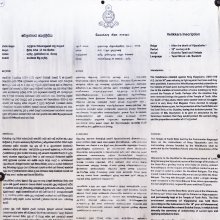Vakku, Vākku: 3 definitions
Introduction:
Vakku means something in biology, Tamil. If you want to know the exact meaning, history, etymology or English translation of this term then check out the descriptions on this page. Add your comment or reference to a book if you want to contribute to this summary article.
Images (photo gallery)
Biology (plants and animals)
Source: Google Books: CRC World Dictionary (Regional names)Vakku in India is the name of a plant defined with Crotalaria juncea in various botanical sources. This page contains potential references in Ayurveda, modern medicine, and other folk traditions or local practices It has the synonym Crotalaria ferestrata Sims (among others).
Example references for further research on medicinal uses or toxicity (see latin names for full list):
· Plant Genetic Resources Newsletter (1993)
· JATBA (1959)
· A Numerical List of Dried Specimens (5363)
· Bangladesh J. Pl. Taxon. (1994)
· Botanical Magazine (1933)
· Species Plantarum. (1802)
If you are looking for specific details regarding Vakku, for example side effects, extract dosage, diet and recipes, pregnancy safety, health benefits, chemical composition, have a look at these references.

This sections includes definitions from the five kingdoms of living things: Animals, Plants, Fungi, Protists and Monera. It will include both the official binomial nomenclature (scientific names usually in Latin) as well as regional spellings and variants.
Languages of India and abroad
Kannada-English dictionary
Source: Alar: Kannada-English corpusVākku (ವಾಕ್ಕು):—
1) [noun] expression or communication of thoughts and feelings by spoken words.
2) [noun] that which is spoken; utterance; speech.
3) [noun] the tongue, as one of the five organs of action, in human beings.
4) [noun] Sarasvati, the Goddess of Speech.
Kannada is a Dravidian language (as opposed to the Indo-European language family) mainly spoken in the southwestern region of India.
Tamil dictionary
Source: DDSA: University of Madras: Tamil LexiconVakku (வக்கு) [vakkutal] 5 transitive verb perhaps from vakṣ. cf. வதக்கு-. [vathakku-.] To burn, singe; to roast; வதக்குதல். கொழுப்பரிந்து . . . வக்குவன வக்குவித்து [vathakkuthal. kozhupparinthu . . . vakkuvana vakkuvithu] (பெரியபுராணம் கண்ணப். [periyapuranam kannap.] 145).
--- OR ---
Vakku (வக்கு) noun < வக்கு-. [vakku-.] Being singed or burnt; being roasted; வேகுகை. நெருப்புச்சிந் தலின் வக்கிலாத்திசைகளு மில்லை [vegukai. neruppuchin thalin vakkilathisaigalu millai] (கம்பராமாயணம் இராவணன்வதை. [kambaramayanam iravananvathai.] 65).
--- OR ---
Vakku (வக்கு) noun < tvac.
1. Skin; தோல். (யாழ்ப்பாணத்து மானிப்பாயகராதி) [thol. (yazhppanathu manippayagarathi)]
2. Contused wound; ஊமைக்காயம். வக்குண்ட காயம். [umaikkayam. vakkunda kayam.] Local usage
3. Water-trough; நீர்த் தொட்டி. (யாழ்ப்பாணத்து மானிப்பாயகராதி) [nirth thotti. (yazhppanathu manippayagarathi)]
--- OR ---
Vakku (வக்கு) noun perhaps from varga. cf. வகை. [vagai.] Means, resources; வழி. அவனுக்குக் கடன் கொடுக்க வக்கில்லை. [vazhi. avanukkug kadan kodukka vakkillai.] (C. G.)
--- OR ---
Vakku (வக்கு) noun < Pkt. vakka < vṛkka.
1. Kidney; மூத்திரக்குண்டிக்காய். [muthirakkundikkay.]
2. Testicle; அண்டவிதை. உன்னை வக்கிலே உதைத்துச் சரியான வழி பண்ணுகிறேன். [andavithai. unnai vakkile uthaithus sariyana vazhi pannugiren.]
--- OR ---
Vākku (வாக்கு) noun cf. bhāga. [Telugu: bāga, M. Travancore usage vāga.]
1. Perfection; correctness; திருத்தம். வாக்கணங்கார் மணிவீணை [thirutham. vakkanangar manivinai] (சீவகசிந்தாமணி [sivagasindamani] 1473).
2. Refined form, shape; திருத்திய வடிவு. வாக் கமை கடுவிசைவில் [thiruthiya vadivu. vag kamai kaduvisaivil] (கலித்தொகை [kalithogai] 137).
--- OR ---
Vākku (வாக்கு) noun < வாங்கு-. [vangu-.]
1. Bend; வளைவு. கோட்டிய வில்வாக் கறிந்து [valaivu. kottiya vilvag karinthu] (நாலடியார் [naladiyar], 395).
2. Irregularity; ஒழுங்கின்மை. [ozhunginmai.] (W.)
--- OR ---
Vākku (வாக்கு) particle A participial suffix, signifying purpose; ஒரு வினையெச்சவிகுதி. கொள் வாக்கு வந்தான் [oru vinaiyechaviguthi. kol vakku vanthan] (தொல். சொல். [thol. sol.] 231, உரை [urai]).
--- OR ---
Vākku (வாக்கு) [vākkutal] 5 transitive verb [Telugu: vāka, K. vāku.] To pour; வார்த்தல். அடர்பொற் சிரகத்தால் வாக்கி [varthal. adarpor siragathal vakki] (கலித்தொகை [kalithogai] 51).
--- OR ---
Vākku (வாக்கு) noun < vāc.
1. Mouth, the organ of speech, one of five karumēntiriyam, q.v.; கருமேந்திரியம் ஐந்தனுள் பேசற் கருவியான வாய். (பிங்கலகண்டு) [karumenthiriyam ainthanul pesar karuviyana vay. (pingalagandu)]
2. Word, speech; சொல். (திவா.) வாக்கினாற் றெருட்டுவா ரில்லை [sol. (thiva.) vakkinar reruttuva rillai] (கம்பராமாயணம் பிரமா. [kambaramayanam pirama.] 201).
3. Voice from heaven. See அசரீரி [asariri],
2. 4. Promise; வாக்குத்தத்தம். அவ னுக்கு அப்படி வாக்குக் கொடாதே. [vakkuthatham. ava nukku appadi vakkug kodathe.]
5. Word of praise, encomium; புகழ்ச்சிச்சொல். வாக்கமை யுருவின் மிக்கான் [pugazhchichol. vakkamai yuruvin mikkan] (சீவகசிந்தாமணி [sivagasindamani] 1258).
6. Capacity to compose poems with felicity; எளிதிற் கவி பாடுந் திறம். அந்தப் புலவர் வாக்குள்ளவர். [elithir kavi padun thiram. anthap pulavar vakkullavar.]
7. Style; நூலின் நடை. அந்த நூலின் வாக்குச் சிறந் தது. [nulin nadai. antha nulin vakkus siran thathu.]
8. Speech form, of four kinds, viz., cūkkumai, paicanti, mattimai, vaikari; சூக்குமை பைசந்தி மத்திமை வைகரி என்ற நால்வகைப்பட்ட ஒலி. நிகழ்த்திடும் வாக்கு நான்கும் [sukkumai paisanthi mathimai vaigari enra nalvagaippatta oli. nigazhthidum vakku nankum] (சிவஞானசித்தியார் சுபக்ஷம் [sivagnanasithiyar supagsham] 1, 24).
9. Vote; ஒரு ஸ்தானத்திற்கு உரியவனாக ஒருவனைத் தேர்ந் தெடுப்பது முதலியவற்றில் தன்னபிப்பிராயத்தைத் தெரிவிக்கும் உரிமை. [oru sthanathirku uriyavanaga oruvanaith thern theduppathu muthaliyavarril thannapippirayathaith therivikkum urimai.] Mod.
--- OR ---
Vākku (வாக்கு) noun cf. bāhu. Side, direction; பக்கம். இரண்டு கைவாக்கு மியங்கலிப்ப [pakkam. irandu kaivakku miyangalippa] (திருவிளையாடற் புராணம் தடாதகை. [thiruvilaiyadar puranam thadathagai.] 26).
--- OR ---
Vākku (வாக்கு) noun Manner, nature; விதம். ஏன் இன்னும் ஒருவாக்காயிருக்கிறாய் [vitham. en innum oruvakkayirukkiray] (பிரதாபசந்திர விலாசம் [pirathapasandira vilasam] 105).
Tamil is an ancient language of India from the Dravidian family spoken by roughly 250 million people mainly in southern India and Sri Lanka.
See also (Relevant definitions)
Starts with (+22): Vakku-nar, Vakkuccakayam, Vakkuccani, Vakkuccaturiyam, Vakkuccitti, Vakkuccol, Vakkuccuttam, Vakkukkannan, Vakkukkurram, Vakkula, Vakkumaru, Vakkunanayam, Vakkunar, Vakkunara, Vakkuniccayam, Vakkunnar, Vakkuntam, Vakkupati, Vakkupavam, Vakkuppa cappi.
Ends with (+27): Alavakku, Amtuvakku, Antanarvakku, Apavakku, Apayavakku, Aruvakku, Attuchavakku, Bhurjatvakku, Campuvakku, Cappaivakku, Caracuvativakku, Celvakku, Cevvakku, Cukkumavakku, Etirvakku, Hasyavakku, Jivavakku, Kaivakku, Kampiravakku, Kararuvakku.
Full-text (+65): Vetavakku, Vakkuvativu, Vakkuniccayam, Vakkuvantanam, Vakkukkurram, Vakkumaru, Teyvavakku, Vakkuttanam, Corcittiram, Cukti, Vakkuvicesham, Vakkan, Vakkincelvi, Vakkuccaturiyam, Kaivakku, Nerntavakku, Vakketu, Cappaivakku, Vakkuvallapam, Vakkupati.
Relevant text
No search results for Vakku, Vaakku, Vākku; (plurals include: Vakkus, Vaakkus, Vākkus) in any book or story.
